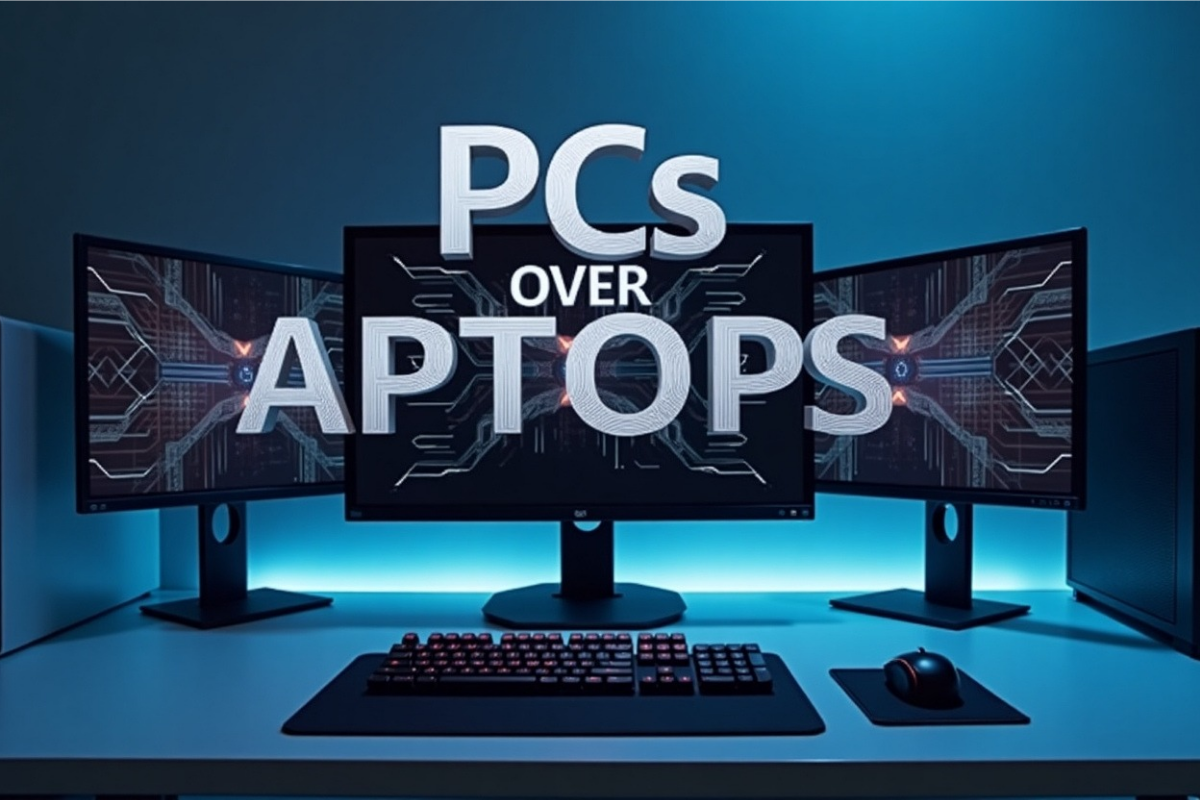Overview
In today’s fast-paced tech world, laptops often steal the spotlight due to their portability. However, if you dig deeper, PCs over laptops remains the smarter choice for many users. Whether you’re a gamer, a creative professional, or someone needing power and flexibility, desktop PCs offer advantages that laptops simply can’t match.
In this comprehensive guide, we’ll explore why PCs are better than laptops in various scenarios, helping you make the best decision based on real-world needs.
Why Choose PCs Over Laptops?
1. Superior Performance
Desktop PCs typically house more powerful components compared to laptops.
Why? Because they don’t have size and heat constraints.
Processors (CPUs) on PCs often have higher clock speeds and more cores.
Graphics cards (GPUs) in desktops are significantly more powerful.
Thermal Management: PCs have better cooling systems, allowing parts to run faster without throttling.
Example:
A gaming desktop with a Ryzen 9 7950X and an RTX 4090 will crush any laptop equivalent in gaming, 3D modeling, and heavy workloads.
2. Easy Upgradability
One of the biggest advantages of PCs is customization and upgradability.
Need more RAM? Add it yourself in minutes.
Want a better GPU? Swap it out without replacing the whole system.
Hard drive full? Install multiple drives easily.
In contrast, laptops are often sealed units with soldered components, making upgrades difficult or impossible.
3. Better Cost-to-Performance Ratio
When comparing PCs and laptops with similar specs:
PCs are generally 20–30% cheaper.
You can invest in higher quality peripherals (keyboard, monitor, mouse) without breaking the bank.
Insight:
For $1000, a PC will deliver more raw power than a $1000 laptop.
4. Longer Lifespan
Desktops tend to outlast laptops because:
Parts run cooler (heat shortens electronic component lifespan).
Easier repairs and upgrades keep systems viable for many years.
Example:
A well-built PC can remain powerful for 7–10 years with minor upgrades, while a laptop might struggle after 4–5 years.
5. Larger Displays and Ergonomics
With a PC setup:
You can connect to larger, multiple monitors.
Ergonomic furniture can be optimized around your workspace.
Reduced neck strain and eye fatigue compared to hunching over a laptop.
For professionals: Designers, programmers, and writers can dramatically boost productivity with a multi-monitor PC setup.
6. The Best Choice for Gamers
If gaming is your passion, choose a PC — no contest.
Desktops can handle 4K gaming and high refresh rate monitors (144Hz, 240Hz).
PC parts can be specifically optimized for gaming (e.g., liquid cooling, overclocked CPUs).
Competitive eSports players almost exclusively use high-performance desktop PCs.
PCs vs Laptops: Head-to-Head Comparison Table
FeaturePC (Desktop)LaptopPerformanceSuperior (High-End)Limited (Thermal Bottlenecks)UpgradabilityEasy & ModularLimited or NonePortabilityStationaryHighly PortableCost-EfficiencyHigherLowerLifespan7–10 Years4–5 YearsGamingBest ExperienceModerateRepairsSimple & CheapDifficult & Expensive
Situations Where Laptops Make Sense
To be fair, laptops are unbeatable in specific use-cases:
Traveling professionals (consultants, remote workers)
Students needing lightweight devices
Casual users prioritizing mobility over performance
But: If you don’t need to move your computer often, a PC is simply the better investment.
How to Decide: PC or Laptop?
H2: Ask Yourself These Key Questions:
H3: 1. Do I need to carry my device every day?
If yes, a laptop wins. Otherwise, a PC will serve you better.
H3: 2. Do I care more about raw power or mobility?
Power = PC.
Mobility = Laptop.
H3: 3. Will I want to upgrade later?
PCs allow future-proofing by upgrading parts piece-by-piece.
Expert Insights: Why Pros Prefer PCs Over Laptops
Gamers: Maximize frame rates and visual fidelity
Graphic Designers: 4K editing without lag
Software Developers: Handle multiple virtual machines
Video Editors: Faster rendering times
Engineers: Better performance with CAD and simulation software
Even big tech companies often issue high-powered desktop workstations to their staff when ultimate performance is needed.
FAQs About PCs Over Laptops
Q1. Is a PC cheaper than a laptop?
Yes.
On average, a similarly specced PC costs 20–30% less than a laptop and offers better performance for the price.
Q2. Can I upgrade my laptop like a PC?
Usually no.
Most laptops have soldered components. PCs, however, allow easy upgrades of RAM, GPU, CPU, and storage.
Q3. Which lasts longer, a PC or a laptop?
PCs last longer because of better cooling, replaceable parts, and easier maintenance.
Q4. Are PCs better for gaming than laptops?
Absolutely.
Desktop GPUs are far more powerful than laptop GPUs, and PCs allow better cooling and higher frame rates.
Q5. What are the downsides of PCs?
Lack of portability
Requires separate monitor, keyboard, and mouse
Takes more physical space
Conclusion: PCs Win for Power, Customization, and Value
If you’re seeking maximum performance, better value, and future-proof options, choosing PCs over laptops is a no-brainer in 2025.
While laptops still dominate in portability, desktops continue to outperform, outlast, and outvalue laptops for serious users.





